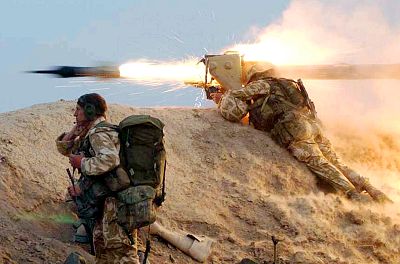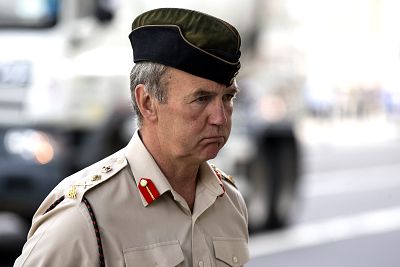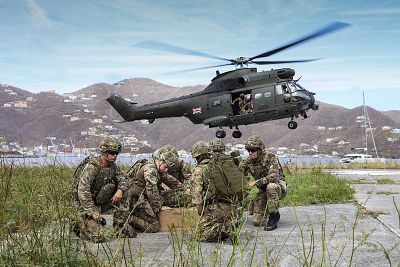A former defense chief says the U.K. faces a hard choice: increase the defense budget or accept a diminished status as a military power.
LONDON — Over the past century American and British troops have fought side-by-side in two World Wars, Korea and the conflicts in the Balkans, Iraq and Afghanistan.
But some lawmakers and experts in the United Kingdom are warning that the British military could soon be seen as irrelevant by the United States unless it receives a colossal funding boost.
"There is a concern that the U.K. is falling ever further behind and becoming even more useless from a U.S. point of view," said Andrew Dorman, an associate fellow at Chatham House, a think tank in London.
Britain has traditionally seen itself as one of the world's leading military powers, and its annual defense spending of 35.3 billion pounds (around $46.6 billion) is still the largest in Europe.
But years of squeezed budgets and rising demand in other areas, such as the publicly funded National Health Service, have dented Britain's military prowess, some warn.
At risk, these experts say, is the so-called special relationshipwith the U.S., a widespread source of pride among many politicians and the defense establishment.
The British Army has shrunk to 82,000 personnel, which the BBC pointed out is the smallest it's been since the Napoleonic Wars some 200 years ago.
And in January a government spending watchdog warned that the Ministry of Defense's shopping list over the next decade was "not affordable" — leaving it as much as 21 billion pounds short (about $27.7 billion).
On Tuesday, lawmakers in the U.K.'s Defense Select Committee published a report urging the government to boost military spending by at least 8 billion pounds a year (around $10 billion) to plug this gaping "black hole" and improve capability elsewhere.
Not only does the U.K. risk "failing both its citizens and its allies," the report said, but it is also in danger of becoming obsolete in the eyes of its American partners and losing traction in NATO.
"Defense spending is an area where a strong message needs to be sent to our allies and adversaries alike," said Defense Committee chairman Julian Lewis.
In response, a Defense Ministry spokesman pointed out that the Britain "maintains the biggest defense budget in Europe" and is currently undergoing a modernization program.
The spokesman also said that the U.K. would "continue to exceed" the NATO target of spending at least 2 percent of GDP on defense. According to some calculations this is true; others say that last year Britain fell just below this threshold.
Military hawks asking for more cash to buy guns, tanks and troop equipment is nothing new in any country.
But unease in Britain has seemingly been magnified because of its decision to leave the European Union, known as Brexit, and criticism from President Donald Trump aimed at allies, especially in Europe, who he says are not pulling their weight militarily.
The U.K.-Trump relationship has not been easy elsewhere either, with the president slapping tariffs on British steel and aluminum, faulting the U.K.'s response to terror attacks and reportedly letting the relationshipwith British Prime Minister Theresa May to grow frosty.
"The person with the greatest influence over European defense spending right now is Vladimir Putin, not Donald Trump."
"As the world grows more unstable, U.S. leadership becomes more unpredictable — particularly toward close allies — and U.K. budgets are becoming increasingly strained, London will have to make some tough decisions about how much defense and security it can afford," said Heather A. Conley, director of the Europe Program at the Center for Strategic and International Studies, a Washington think tank.
Whether criticizing allies such as Canada and Germany, or praising traditional foes like North Korea and Russia, Trump has made the world reassess what it thought it knew about American commitments abroad, Conley said.
This adds another layer of nervousness to Britain's future military planning, she said.
"Should the U.S. remove its military presence in Korea, would the U.K. need to do more? If the U.S. removes forces from Syria, would the U.K. need to fill that vacuum? If Russia continues to pursue an aggressive posture in the North Atlantic and the U.S. does not respond, what will the U.K. do?" she said.
While British defense spending has come under criticism, Trump is increasing his defense budget in an attempt to maintain America's advantage over China and Russia, according to Justin Bronk, a research fellow at London's Royal United Services Institute, or RUSI.
"The U.K. and other NATO allies are simply being left behind," Bronk said, adding that Britain risks needing "so much support from the U.S. that it becomes a burden rather than a helpful military ally."
Of course there are less hawkish voices who question the entire premise of needing to spend billions on a large-scale armed forces.
Others, such as Peter Felstead, editor of the military magazine Jane's Defence Weekly, disagree that Trump is a factor in the U.K.'s thinking.
"The person with the greatest influence over European defense spending right now is Vladimir Putin, not Donald Trump," he said.
It was the Russian president's annexation of Crimea in 2014, he said, rather than any overtures by Trump, that was responsible for shifting the geopolitical climate in Europe and refocusing NATO's attention on Moscow.
Regardless of motive or viewpoint, many experts say that if Britain does indeed want a smaller, less-effective military then it should be more honest with the public.
Former British defense chief Lord Gen. Nick Houghton told BBC radio on Tuesday that the government is "living a lie" by claiming to operate a top-tier military while declining to grant it the necessary funds.
"We've got to make a hard choice," he said. "Do we increase the defense budget ... or diminish our status as a military power?"
Such a funding increase would have drastic consequences for the sluggish U.K. economy, and the issue has reportedly caused strife within May's government.
She caused uproar within her Conservative Party last week when she refused to confirm that Britain would remain a "tier-one" military power, while promising an extra 20 billion pounds a year (around $26.3 billion) to the National Health Service.
"During the [Brexit] referendum, voters were promised much more money for the NHS if they voted to leave the E.U.," said Malcolm Chalmers, RUSI's deputy director-general. "By delivering on this promise, however, other departments — including defense — are unlikely to receive much further relief."
For now, there is deep concern throughout Europe about what Trump will do or say at the NATO summit next month in Brussels.
He is widely expected to reiterate his calls for European powers to up their military game. Dorman, at Chatham House, thinks he may even call into question Article 5, NATO's central mutual defense clause that Trump only backed last year after months of mixed messages.
"The president delights in throwing away his prepared remarks," Conley, at CSIS, said, "which is why the uncertainty and nervousness grows."














